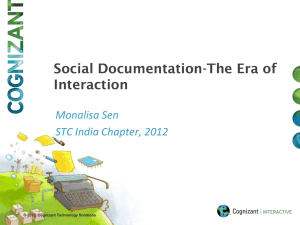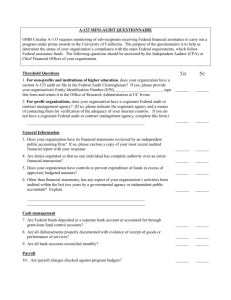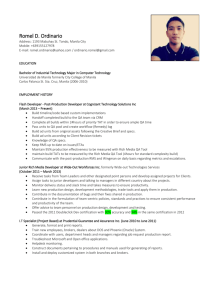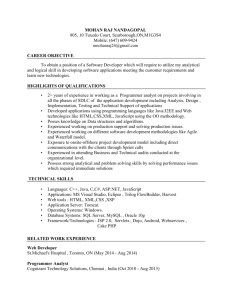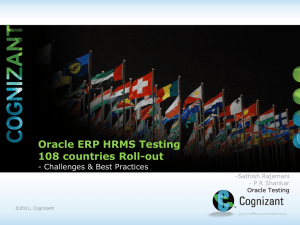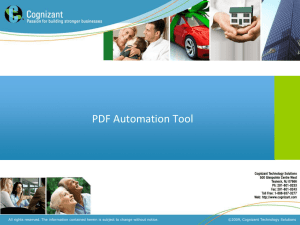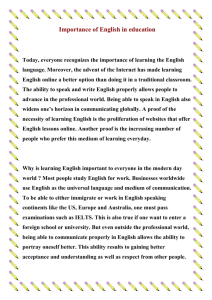grant application and guidelines
advertisement
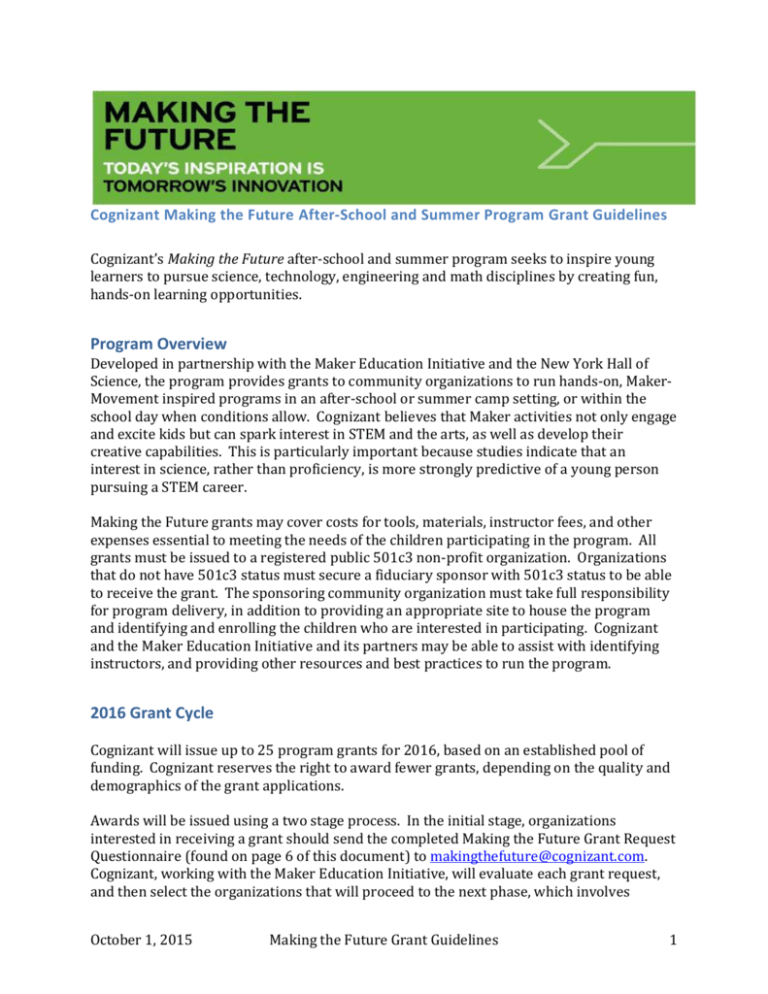
Cognizant Making the Future After-School and Summer Program Grant Guidelines Cognizant’s Making the Future after-school and summer program seeks to inspire young learners to pursue science, technology, engineering and math disciplines by creating fun, hands-on learning opportunities. Program Overview Developed in partnership with the Maker Education Initiative and the New York Hall of Science, the program provides grants to community organizations to run hands-on, MakerMovement inspired programs in an after-school or summer camp setting, or within the school day when conditions allow. Cognizant believes that Maker activities not only engage and excite kids but can spark interest in STEM and the arts, as well as develop their creative capabilities. This is particularly important because studies indicate that an interest in science, rather than proficiency, is more strongly predictive of a young person pursuing a STEM career. Making the Future grants may cover costs for tools, materials, instructor fees, and other expenses essential to meeting the needs of the children participating in the program. All grants must be issued to a registered public 501c3 non-profit organization. Organizations that do not have 501c3 status must secure a fiduciary sponsor with 501c3 status to be able to receive the grant. The sponsoring community organization must take full responsibility for program delivery, in addition to providing an appropriate site to house the program and identifying and enrolling the children who are interested in participating. Cognizant and the Maker Education Initiative and its partners may be able to assist with identifying instructors, and providing other resources and best practices to run the program. 2016 Grant Cycle Cognizant will issue up to 25 program grants for 2016, based on an established pool of funding. Cognizant reserves the right to award fewer grants, depending on the quality and demographics of the grant applications. Awards will be issued using a two stage process. In the initial stage, organizations interested in receiving a grant should send the completed Making the Future Grant Request Questionnaire (found on page 6 of this document) to makingthefuture@cognizant.com. Cognizant, working with the Maker Education Initiative, will evaluate each grant request, and then select the organizations that will proceed to the next phase, which involves October 1, 2015 Making the Future Grant Guidelines 1 developing a memorandum of understanding, or MOU. The details of the program will be finalized, and budgets may be adjusted accordingly. This second phase will be collaborative, and in most cases will result in a grant being issued to the selected organization, unless significant obstacles arise during MOU development. The grant request period will run from October 1– November 16, 2015. All applications must be received by 12:00 midnight Pacific Time on November 15th in order to be considered. No late applications will be considered. Cognizant will acknowledge receipt of the application, by email, within 48 hours. Cognizant expects to inform organizations by January 2, 2016 if their program has been selected to move on to the MOU stage. Grant requests must be for programs that will start in calendar year 2016, but programs may continue over into 2017. Types and sizes of grants Grants should fund a specific instance of a Maker program (they are not intended to fund a perpetual program or facility). A grant may be for a first time program, or to repeat/ expand a previously offered program. First-time program grant requests may include all the components of the grant (tools and equipment, coach/instructor stipends, materials, and other costs). For those organizations that have previously received a Making the Future grant, or organizations that already have established a Makerspace or Fablab, the grant request should not include the tooling component of the grant unless specific tooling is required for new program activities. Grants may range from $5000 to $25,000, and must be in increments of $500. Cognizant’s goal is to serve as many children in as many locations as possible, so we encourage each grantee to be as efficient and cost-effective as is possible. Overhead and administrative costs should be kept to a minimum. Instructor rates should be in line with local rates. Cognizant also encourages organizations to seek other local funding sources to offset some of the costs of the program. Selection Criteria Cognizant and the Maker Education Initiative will evaluate each grant request on the following criteria: Alignment with Making the Future program guiding principles, identified below. Strength and execution track record of the grantee in serving children through hands-on, STEM and the Arts programs. Geographic location of the program. We tend to fund programs in regions of the country where Cognizant has a substantial employee presence or business interests. We typically fund one or at most two programs per city or metropolitan area. Demographics of children served. Perceived community need (communities without existing Making opportunities have higher need). October 1, 2015 Making the Future Grant Guidelines 2 Value the program provides relative to the requested grant amount. Value may be measured in terms of quality of the activities, number of children served, or hours of program time. Intent to leverage the initial grant to offer future programs. Program Guiding Principles Cognizant is very flexible on the format, structure, age group, demographics, and types of activities that are conducted in the programs it funds. However, it asks that grant recipients consider the following five guiding principles that shape quality Making programs: 1. The program must include fun, hands-on, project-based, and engaging activities. 2. Children must make something, versus doing experiments or activities that don’t have a final product. 3. Programs can follow a set of planned activities, but should allow for individual creativity, deviation, experimentation, and encourage trial and error. 4. Children should be able to keep the projects they make so that they can share their pride in their accomplishments, re-tell the Making process, and bring Making into their community. 5. Programs should be long enough in duration that children can immerse themselves in a meaningful experience. This refers to both total program duration (20 – 40 hours or more) and session duration (typically 90 minutes or more, although shorter for young children). To be considered for a Making the Future grant, applications must address principle 1, 2 and 5. Cognizant will consider requests that deviate slightly from principles 3 and 4. Typical Making the Future Program Attributes This section describes the typical attributes and requirements of programs funded under a Making the Future grant. For those new to Maker programs, we strongly encourage reading “A Blueprint: Maker Programs for Youth” published by the New York Hall of Science in conjunction with Cognizant. It can be found at: http://dmp.nysci.org/#news/51 Target Audience: Programs can target children of all backgrounds in pre-K through12th grade levels. There are no specific requirements for socio-economic, gender, or race of targeted children, although our goal is to have at least half of the funded programs to be serving high-need communities, and encourage focusing on girls and minorities, both under-represented in the STEM disciplines. October 1, 2015 Making the Future Grant Guidelines 3 Skill Level: At this point in time, most Making the Future programs are “beginner” level and target children with no prior hands-on project or “making” experience. However, Cognizant will consider grant requests for programs that target any skill level. Program Duration: The total duration of the program should be 20 to 40 hours per participant to give children the chance to overcome initial reservations about Making and increase the chances of sparking the “Maker” passion within them. Shorter or longer duration programs will be considered based on community needs. Types of Activities: The types of project activities can be very wide-ranging so as to attract a broad range of children, and may include but are not limited to making electronic gadgets, robots, craft-oriented projects, digital fabrication, software oriented projects, music, hydroponics, food, and clothing / wearable projects. Program Schedule: A variety of delivery schedules are possible, depending on the needs of the sponsoring organization and the children they serve. For example, Cognizant has funded after-school programs in the following formats: After-school, meeting once a week for 2 hours for 14 weeks Week-long winter school vacation week camp, meeting 4 hours per day 2 hour program embedded in a summer day camp, meeting for 8 weeks A summer-long series of workshops A Saturday program, meeting 2 hours each Saturday from October through May An in-school program, offered in 40 minute blocks once a week, to an entire grade level A school-day internship model, meeting for 5 hours twice a week, for 14 weeks Facilities: The organization must have access to a facility (room or rooms) to conduct the program, with ample surface workspace to support a limited number of low cost tools (to cut, solder, sew, glue, etc.). Past programs have been conducted in rooms at science museums, schools, libraries, churches, community centers, and existing Makerspaces. From our experiences, an organization will typically need a 400- 500 square foot space to accommodate 12 – 15 young Makers. Tools: Programs will require a basic set of tools to do traditional “making” activities. Some organizations may have existing FabLabs, Makerspaces or shops and may not need funds for tools. However, most organizations will use a portion of the grant funds to purchase tools. Typical tooling will depend on the activities planned, but often include 3D printer, vinyl cutter, laptops, soldering irons, sewing machines, and small hand tools such as wire cutters, screwdrivers, drills, hand saws, etc. If the hosting organization is requesting grant funds to acquire tools, they must handle procurement of the tools. Materials: In most cases, physical materials will be required to create the projects (one exception is purely digital or software projects). These materials may include electronic components, kits, microcontrollers, gears, wheels, fabric, wood, PVC, glue, batteries, lights, recycled materials, and so on, depending on the activities planned. Depending on the age October 1, 2015 Making the Future Grant Guidelines 4 level and program duration, the budget for materials/consumables will range from $10$200 per child. Material purchases can be funded through the program grant. The hosting organization will need to procure the materials. Coaches (Facilitators) Qualifications: A critical element to the program is having one or more experienced Maker Coaches or Facilitator to lead and facilitate the program. Grant funds are intended to be used by the sponsoring organization to hire qualified coaches. Volunteer instructors from the community or the hosting organization can be used, if available. Coaches should be experienced in working with children, and also comfortable in overseeing hands-on project work. Cognizant is a supporter of the Maker Education Initiative’s Maker Corps program. However, this grant process is not directly affiliated with Maker Corps, so the grantee should make no initial assumptions about the ability to incorporate Maker Corps members into the program. The hosting community organization will need to perform background checks on the coaches to ensure a safe environment for children. The organization must handle payment of all coach fees. Coach to Student Ratio: With a class size of 12 – 15 young Makers, we typically see the need for 1 lead coach, strongly versed in Making activities, and one assistant (paid or volunteer) who can be less familiar, but willing to learn, the skills required. Other Requirements The following are additional requirements required of the grant recipient (further details will be provided during the MOU phase): Student Documentation: During the program, Cognizant encourages the hosting organization to document the work of their young makers by either creating a blog or Tumblr site, and, if appropriate, having the children document their work using these tools. Record Keeping: The grant recipient must maintain accounting records of all expenses procured under the program (tools, materials, coach fees, etc.) Final Report: The grant recipient will be required to submit a final report that includes a program summary, itemization of expenditures, student attendance and successes and challenges experienced. A student exit survey to obtain feedback, suggestions, favorite projects, interest in future programs, etc. Branding and Publicity Considerations: Cognizant and the organization receiving the grant will work together to create visibility and recognition of the program, including, but not limited to: press releases, interviews, website mention, marketing collateral and social media. The organization may choose an appropriate name for the program, but should indicate that it is sponsored under Cognizant’s Making the Future program. Photo releases are required from all participants. October 1, 2015 Making the Future Grant Guidelines 5 Visitation: Cognizant may, from time to time, invite local, state, or national public officials to visit the program. Cognizant will coordinate any visits with the organization and the coach in advance of the visit. Privacy and Ethics: Cognizant and the organization will work together to ensure the privacy of all children in the program. The organization will not share the full names, addresses, or other personally identifiable information with Cognizant or any other outside organization, without parental approval, unless required under law. October 1, 2015 Making the Future Grant Guidelines 6 Making the Future Grant Request Application The following information is required from organizations applying for a Making the Future program grant. Please submit responses, using the structure below, to makingthefuture@cognizant.com in Microsoft Word or compatible format. If exact answers are not yet known, please indicate a range of options or current estimates. 1. Legal name of organization: 2. Program contact (Name, Email Address): 3. Organization overview (please limit to 250 words or less, words in excess of 250 will not be considered): 4. Program overview, including types of activities planned (please limit to 250 words or less, words in excess of 250 will not be considered): 5. Address of location(s) where program will be delivered: 6. Fiduciary sponsor (if applicant organization is not a public 501c3): 7. Approximate program start and end dates: 8. Program format and frequency (e.g. “Afterschool program meeting once a week for 2 hours, running 14 weeks” or “5 summer sessions, each session lasting one week, running approximately 4 hours per day, 5 days per week): 9. Program duration (total hours of program time per participant): 10. Expected total number of children served (per session, for each session, if more than one session): 11. Target ages or grades: 12. Expected demographics of children (gender, race, economic status, etc.): 13. Grant request amount (in increments of $500, minimum $5,000, maximum $25,000): 14. Program budget (sum of 15 - 18): 15. Total tools and equipment cost (attach/include itemized equipment list): 16. Total consumable and project material cost (attach/include list of consumable materials, kits, supplies): October 1, 2015 Making the Future Grant Guidelines 7 17. Coach costs: a. Total Coach hours (may be greater than program hours to include preparation and reflection time): b. Number of Coaches: c. Coach hourly rate(s): d. Total Coach costs: 18. Other costs, including rent, food, transportation, etc. Please itemize. October 1, 2015 Making the Future Grant Guidelines 8
